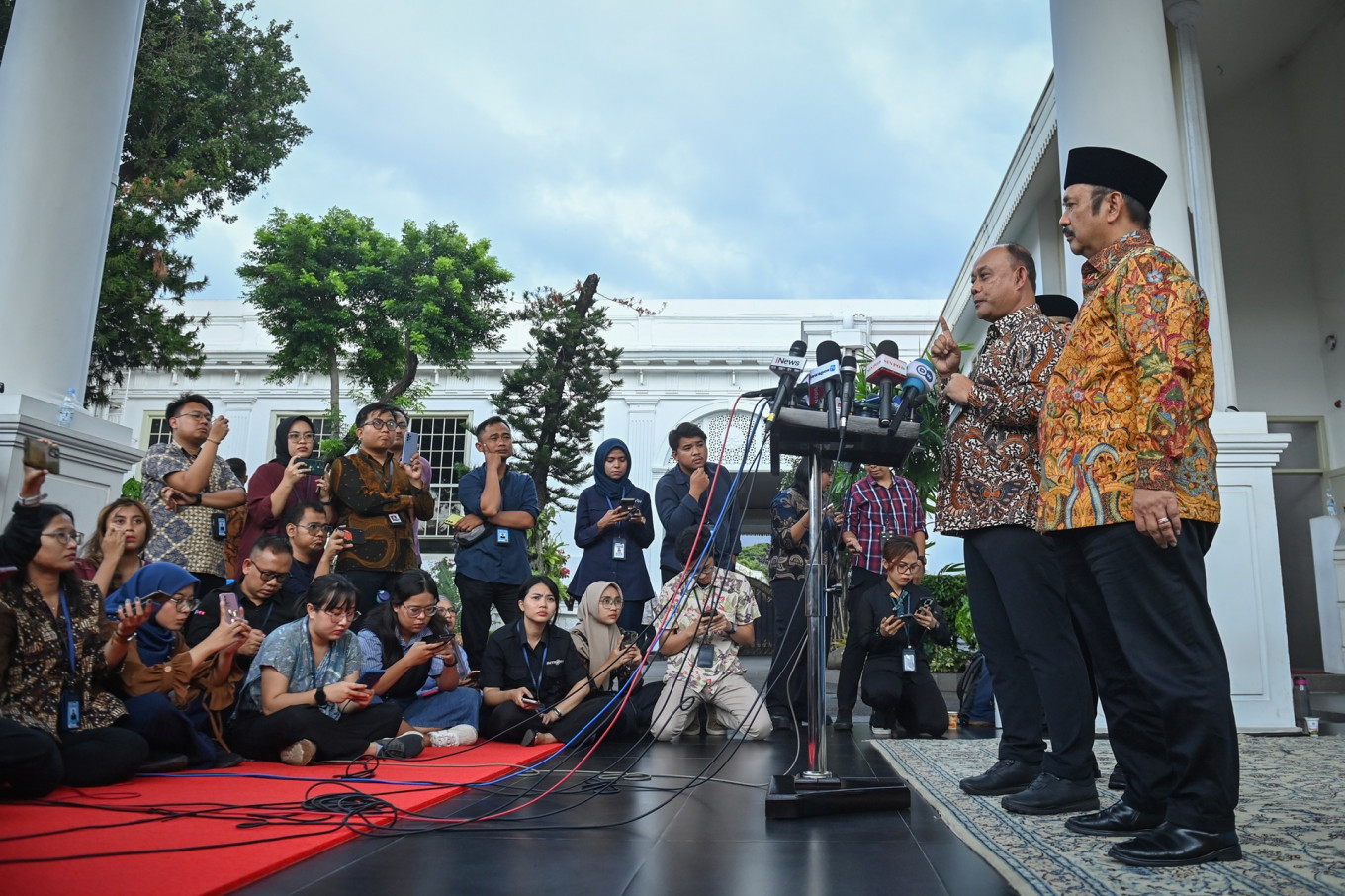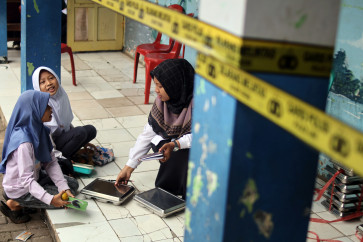Popular Reads
Top Results
Can't find what you're looking for?
View all search resultsPopular Reads
Top Results
Can't find what you're looking for?
View all search resultsWhither journalism, whither democracy?
The role of journalism in keeping society critically informed for people to make the right decisions, day-in and day-out, has been undermined, if not compromised.
Change text size
Gift Premium Articles
to Anyone
 Power of information: National Nutrition Agency (BGN) head Dadan Hindayana (second right) and National Development Planning Minister Rachmat Pambudy (right) talk to journalists at a press briefing after a cabinet meeting about the free meals program with President Prabowo Subianto at the Presidential Palace complex in Jakarta on Jan. 17, 2025. (Antara/Aditya Pradana Putra)
Power of information: National Nutrition Agency (BGN) head Dadan Hindayana (second right) and National Development Planning Minister Rachmat Pambudy (right) talk to journalists at a press briefing after a cabinet meeting about the free meals program with President Prabowo Subianto at the Presidential Palace complex in Jakarta on Jan. 17, 2025. (Antara/Aditya Pradana Putra)
I
n many ways, this year’s unusually subdued commemoration of National Press Day on Feb. 9 reflects the sorry state of journalism today, a profession that has come under siege, raising doubts about its wide claim of indispensability to democracy.
The role of journalism in keeping society critically informed for people to make the right decisions, day-in and day-out, has been undermined, if not compromised.
People are constantly bombarded with tons of information, mostly unverified. The irony of today’s digital media landscape is that the greater access to news afforded by the explosion in information technology does not necessarily lead people to becoming better informed, or wiser.
Journalists, whose job it is to verify information before it reaches people, are no longer the only purveyors of news in this media landscape. They have become a tiny minority since anyone with access to the internet today, and that is literally everyone, has the power to influence people by disseminating information, whether true or false.
The proliferation of misinformation and disinformation has dramatically changed the political landscape globally. The backsliding seen in every democracy has resulted in part from the inability of journalists to live up to their role as the fourth pillar of democracy.
They are not only ceding ground in the fierce competition for eyeballs in the media landscape, but they are also failing in their role of keeping accountable the powerful political institutions, including the executive and legislative branches of the government, the judiciary and big businesses and powerful oligarchs.
News media outlets find that they no longer have the power to set the national agenda. In an industry increasingly defined more by speed and less by accuracy, almost anyone can determine what goes viral in the digital news atmosphere. Journalism, which is the discipline of verification, is slowed by its own definition and just cannot keep up.
Many media news outlets failed to make the transition to the digital landscape from their print and broadcasting platforms. Those that have made the transition have been forced to shrink in size in the absence of effective business models to finance the large costs of running a newsroom. Every year, particularly since the COVID-19 pandemic, we hear news of media outlets of all sizes closing shops.
As it is making the transition, the news media industry is suffering an identity crisis: What to call itself. Mass media? What a laugh. Established media? Not when you are financially unstable. Traditional media? Too ancient. Legacy media? Yeah right.
More serious than the demise of media outlets is the loss of the services of those who have dedicated themselves to the noble task of ensuring that society is well informed in making the right decisions. Thousands of journalists have been laid off and thousands of others have simply abandoned the profession they see as no longer promising.
When the school of communications of a prominent state university in Indonesia stopped offering journalism studies because it could not attract any students, we knew the profession was in serious trouble. They found it difficult to find fresh talent.
This is bad news for Indonesia’s democracy, which is already in retreat. Democracy cannot function without the support of independent journalists to keep society critically informed about the world they live in. We are witnessing many democracies, including the most established ones, shifting toward authoritarianism because journalists aren’t living up to expectations.
On National Press Day, those who stand their ground and keep faith in journalism should reaffirm their commitment to protect the profession.
We are already seeing many innovations from creative minds, from start-ups, but also from the “legacy” media, to reinvent journalism suitable to today’s information landscape. But we need to see a lot more innovations to reach the critical mass for change before we can make a difference.
The media industry, and the journalism profession it supports, may have been slow to adapt to the digital challenge, but it is never too late.
The survival of our democracy depends largely upon the survival of journalism.










